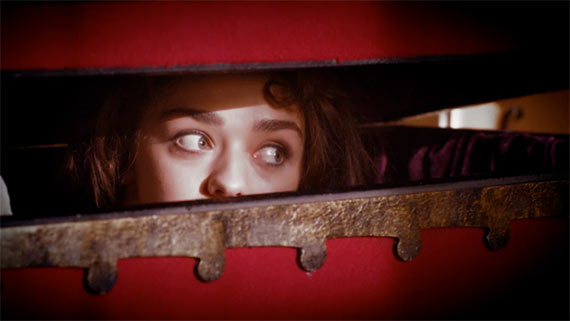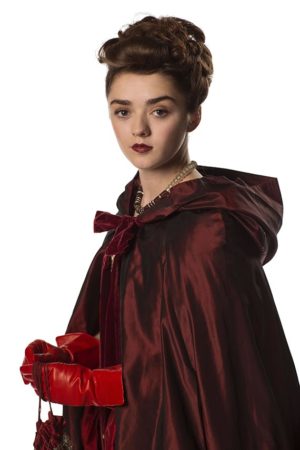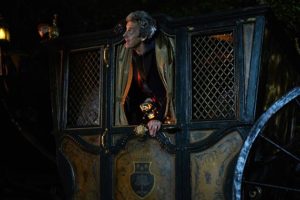2nd Opinion: The Woman Who Lived
David Selby and Connor Johnston give their verdicts on the 6th episode of Series 9.
David’s Verdict

It was clear from the off that Torchwood writer Catherine Tregenna was the perfect fit for this episode. There is no more sensible combination of writer and brief than The Woman Who Lived and the woman known best for her tragic and intelligent portrayals of immortal characters and the effects of living beyond your years.
For the most part, Tregenna takes what she established in Out of Time and works it effortlessly into a Doctor Who setting, though when it comes to the main plot this is slightly detrimental. I was beginning to think the show was past using undeveloped alien cultures as the threat of the week and labelling all members of a species bad based on their reputation, and an episode dealing with the consequences of the Doctor’s previous actions would make more sense without the show’s ‘monster of the week’ convention, thus emphasising that this isn’t an ordinary adventure in which the ordinary hallmarks of the show play out. I was also not a fan of the idea that every death is a fracture in reality: death is a natural process; as natural as birth and as natural as living.
 And let’s be honest – most people who loved this episode didn’t love it for the plot. The heart of The Woman Who Lived came from Maisie Williams and the character of Ashildr, and her interactions with the Doctor. Rather than just stopping at the depiction of ordinary people as mayflies from the perspective of immortals, Tregenna takes the idea a step further and uses it to show what makes ordinary, mortal people so infinitely profound, crediting the ‘mayfly’ viewer just as much if not more so than the invincible protagonist. This continues the previous episode’s metafictional undertones, this time around contemplating on what makes the companion-figure so precious to Doctor Who.
And let’s be honest – most people who loved this episode didn’t love it for the plot. The heart of The Woman Who Lived came from Maisie Williams and the character of Ashildr, and her interactions with the Doctor. Rather than just stopping at the depiction of ordinary people as mayflies from the perspective of immortals, Tregenna takes the idea a step further and uses it to show what makes ordinary, mortal people so infinitely profound, crediting the ‘mayfly’ viewer just as much if not more so than the invincible protagonist. This continues the previous episode’s metafictional undertones, this time around contemplating on what makes the companion-figure so precious to Doctor Who.
The character development through the entirety of the episode is spot-on, from the progressive snippets of Ashildr’s life to her cold plan against the Doctor’s moral worldview and her realisation that the mayflies are more precious than securing an unchanging eternity. The concepts of eternity and immortality and how they juxtapose each other form a fascinating emotional arc: is it better to live in an unchanging world where everything around you is safe, or to live in a fragile, changing one which allows you to change and develop as a human being yourself? Tregenna communicates this dilemma through some truly chilling dialogue sequences.
And yet, in spite of its enriching content, the real charm of The Woman Who Lived lies in our own speculation. The episode opens a plethora of doors to the future; of potential future appearances from Maisie Williams, new ways to tackle the Doctor’s influence on ordinary lives, and of next week’s episode, a similar idea – in the long run, does the Doctor really bring peace? For a change, I’d like to end this review by highlighting how much I’m looking forward to the next episode, which seems from its trailers to not only be a Bond-esque blockbuster, but also apparently a culturally-conscious piece of television. Doctor Who appears to be returning to the modern world not just literally, but politically.
Connor’s Verdict
Catherine Tregenna is a writer whom I’ve always adored, with all 4 of her episodes in Torchwood being quite highly respected in my affection of the spin-off. As such there indefinitely was a high expectation leading into her first contribution to Doctor Who – and with the duty of continuing the story of Ashildr from the previous week’s adventure, it seemed to be easy feat. This week’s episode had no landmark villain or resolution to compete with or hide behind, its saving grace didn’t come in the form of a shocking twist nor a memorable revelation… however what it did rely on was something that fortunately both Doctor Who and Tregenna excel in magnificently: incredibly sincere storytelling.
 In many ways, the Doctor spends most of the episode looking through a mirror – given how reflective the character of Ashildr is to the Time Lord himself. Both characters are burdened with incredibly long lifespans, both have loved, both have saved as well as taken lives, both have suffered incredible loss and incredible loneliness – and most significantly both have felt trapped in a life that left them craving more – the only difference being the Doctor had the ability to escape while Ashildr was forced to consume every wavering second. If the Doctor can be labelled “The Man Who Ran Away”, Ashildr truly is “The Woman Who Lived”. To capture such a striking juxtaposition, a script relies heavily on its acting talent – and both Peter Capaldi and Maisie Williams once again provide such honest and meaningful performances. There’s more than just a confidence that is new to Capaldi’s Doctor this series; there’s an awareness and wisdom of the universe that could easily fool anyone into believing he’d been portraying the character his entire life. This week’s episode proves once again that ‘The Doctor’ was the role Peter Capaldi was born to play. Similarly Maisie Williams captures the impossibility of Ashildr’s situation with ease, and cements herself as one of the most memorable characters of Capaldi’s tenure, and one I’m personally thrilled to see become increasingly crucial as time progresses.
In many ways, the Doctor spends most of the episode looking through a mirror – given how reflective the character of Ashildr is to the Time Lord himself. Both characters are burdened with incredibly long lifespans, both have loved, both have saved as well as taken lives, both have suffered incredible loss and incredible loneliness – and most significantly both have felt trapped in a life that left them craving more – the only difference being the Doctor had the ability to escape while Ashildr was forced to consume every wavering second. If the Doctor can be labelled “The Man Who Ran Away”, Ashildr truly is “The Woman Who Lived”. To capture such a striking juxtaposition, a script relies heavily on its acting talent – and both Peter Capaldi and Maisie Williams once again provide such honest and meaningful performances. There’s more than just a confidence that is new to Capaldi’s Doctor this series; there’s an awareness and wisdom of the universe that could easily fool anyone into believing he’d been portraying the character his entire life. This week’s episode proves once again that ‘The Doctor’ was the role Peter Capaldi was born to play. Similarly Maisie Williams captures the impossibility of Ashildr’s situation with ease, and cements herself as one of the most memorable characters of Capaldi’s tenure, and one I’m personally thrilled to see become increasingly crucial as time progresses.
In the same way “Turn Left” was a “Doctor-Lite” adventure that had so much to say about the influence of the Doctor, “The Woman Who Lived” is (despite for the most part being Clara-free) an episode that at its core is about companionship. The episode maintains that immortality is nothing without someone to remind you why life is worth living: “What’s the point of living forever if you’ve got no one to share it with?” On top of commentating on the value the Doctor has for his companions, the episode also deals heavily on the consequence that the Doctor’s ephemeral role in their lives leaves behind. Continuing the trend of painfully hinting at Clara’s eventual fate we’re left to ponder how much of a toll her inevitable departure is already having on the Doctor. The closing scene in the TARDIS effortlessly captures the co-dependent nature of their relationship, and showcases such a loved dynamic that we’re slowly but surely running out of time to appreciate.
 For the second week in a row, we’ve been left with an episode overflowing with dialogue that could very easily be mistaken for poetry – which truly is a measure of what tremendous writing talent we currently have working on the show. However as poignant and touching as the finished product is, it’s not completely free from flaws. Initially, it does seem as though the story is undecided on the type of episode it wants to be, with an almost jarring flippancy in tones plaguing the opening scenes. Now this isn’t to say that the robbery scenes aren’t still entertaining to a certain degree, but on initial viewing they do seem somewhat misplaced. Luckily, by the time the episode really kicks into gear the narrative has stabilised profoundly, once again achieving the perfect balance between humour, emotion and adventure one has come to expect from such a successful series.
For the second week in a row, we’ve been left with an episode overflowing with dialogue that could very easily be mistaken for poetry – which truly is a measure of what tremendous writing talent we currently have working on the show. However as poignant and touching as the finished product is, it’s not completely free from flaws. Initially, it does seem as though the story is undecided on the type of episode it wants to be, with an almost jarring flippancy in tones plaguing the opening scenes. Now this isn’t to say that the robbery scenes aren’t still entertaining to a certain degree, but on initial viewing they do seem somewhat misplaced. Luckily, by the time the episode really kicks into gear the narrative has stabilised profoundly, once again achieving the perfect balance between humour, emotion and adventure one has come to expect from such a successful series.
For an episode where remarkably little happens in terms of basic plot development, the atmosphere of “The Woman Who Died” and the eventual conclusion remains quite intense and rewarding. Leandro’s presence in the episode serves the plot’s purposes well in contributing a certain level of danger to the storyline’s progression as well as an incredibly climactic and action-packed attack scene. Despite however being the designated ‘villain’ for the episode, he’s not the source of intimidation that the plot so fluently maintains. The threat of the episode is rather derived from a more unorthodox source; being that of Ashildr’s unpredictability and the audience’s (as well as the Doctor’s) uncertainty of how much immortality has corrupted the young woman we grew an affection for last week. This uncertainty sees its own resolution in the tavern scene towards the conclusion of the episode which is undoubtedly its crowing jewel (if you’ll pardon the pun) of both the plot and the Doctor and Ashildr’s journey together so far. Honest, warming and weighted storytelling – what more could one wish for?
Now we’ve reached the half way mark…
Given that we’ve now officially concluded Series 9 Part 1, I thought it only fitting to include a retrospective view on how it’s fared for me personally so far. With 6 episodes down and 6 to go; we’ve already had a stunning opening episode that individually reminded me why I’m a fan of the show, a familiar yet simultaneously original and inventive take on one of Doctor Who’s most loved settings, and finally two character driven narratives that touch on the burden of immortality and the consequences of the Doctor’s actions in a way that’s never been done before. The series is being led by two of the most profound and impressive actors the TARDIS has ever known, while behind the scenes we have a creative team whom with the show have matured and grown to produce an incredible quality of storytelling.
In comparison to previous series, I’ve struggled to pinpoint a first half that has been as unanimously acclaimed by both critics and fans alike in the last 10 years. While Series 4 comes close in terms of initial reception and enjoyment; I can’t help but feel that there’s a certain maturity, atmosphere and class that hasn’t been present in Doctor Who – arguably ever before. So while we’re still half a series away from having a more substantiated judgment, Peter Capaldi’s second series of Doctor Who most definitely has the ability and opportunity to be the most rewarding and loved yet.








